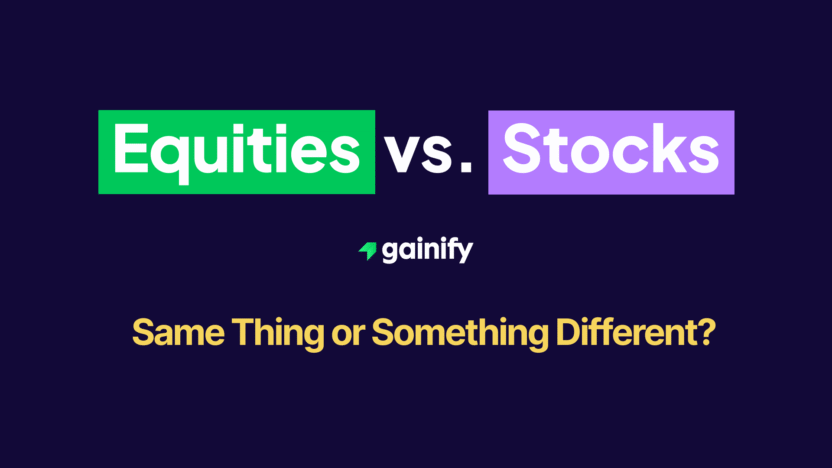For new investors, the terms equities and stocks often sound like they mean the same thing. In fact, they are frequently used interchangeably in financial media and even inside banks.
But while equities can often be a synonym for stocks, there are situations where the two terms carry different meanings. Understanding that distinction can make you a more confident and informed investor.
What Are Equities?
At its core, equity means ownership. If you own equity in a company, you hold a claim on part of its assets and on its future profits. Unlike debt, which must be repaid with interest regardless of performance, equity represents the residual value that belongs to shareholders after all obligations have been met.

Equity can take many forms:
- Common equity: Ordinary shares that provide holders with voting rights and the potential to receive dividends. These shares also tend to rise or fall in value depending on the company’s financial performance and how the market views its prospects.
- Preferred equity: A type of security that sits between debt and equity. Preferred shares usually lack voting rights, but they give holders priority over common shareholders when dividends are distributed or when the company is liquidated. This makes them appealing for investors who value stability over influence.
- Private equity: Ownership stakes in businesses that are not publicly traded. These investments often require longer holding periods and involve active management, since liquidity is limited until a sale, merger, or public offering occurs.
- Real estate equity: The portion of a property’s value that the owner truly controls, calculated as market value minus outstanding debt. In many ways, this mirrors business equity since it shows the net ownership position once liabilities are accounted for.
In everyday language, people often use the word “equities” to mean stocks, but the concept is broader. Equity encompasses any form of ownership interest, whether in companies, private ventures, or physical property. It is essentially a measure of participation in value creation, not just shares listed on markets such as the NYSE or NASDAQ.
What Are Stocks?
Stock is a specific type of equity. A stock is a tradable security that represents a slice of ownership in a publicly listed company. When you purchase stock, you acquire a proportionate claim on the company’s assets and earnings, which gives you a direct financial stake in its success or failure.

Stocks are bought and sold on exchanges, such as the New York Stock Exchange or Nasdaq, which provide the platform for transparent pricing and liquidity. Prices are quoted on a per-share basis and change throughout the trading day as supply and demand respond to news, earnings reports, interest rate shifts, and broader market sentiment.
Stocks come in two main varieties:
- Common stock: The most widely held form, usually carrying voting rights and potential dividends. The value of common stock is strongly tied to the company’s growth prospects and overall profitability.
- Preferred stock: A less common form that generally does not include voting rights but offers priority for dividends and in the event of liquidation. Preferred stockholders trade some influence for greater income stability.
In everyday investing, the word “stock” usually refers to the individual shares of a specific company. For example, an investor might buy Apple (AAPL) to gain exposure to the technology sector or JPMorgan Chase (JPM) to invest in financial services. Over time, stock ownership allows investors to benefit from both dividend payments and capital appreciation as companies expand and generate higher profits.
Equities vs. Stocks: How They Relate
Here’s the simplest way to think about it:
- Equities = Ownership (the broader concept).
- Stocks = Units of ownership you can trade (a subset of equity).
That’s why financial media might use “stocks” when talking about price moves of Apple or Tesla, while professional investors might say “global equities” when referring to the whole asset class of publicly listed shares.
Equities Can Be a Synonym for Stocks
In practice, particularly in investment banking and asset management, “equities” is often just another word for stocks.
- An “equities department” at a bank covers publicly listed shares, with teams in research, trading, and equity capital markets.
- When investors say “equities allocation” in a portfolio, they mean exposure to stocks, often through ETFs or mutual funds.
- In UK markets especially, “equities” almost always means stocks.
So in the real world, you can treat equities and stocks as synonyms most of the time.
Where Equity and Stock Differ
The terms diverge when you move outside the public markets:
- Owning a private business stake is equity, but not a stock.
- A venture capital fund holds equity in startups, but those are not publicly traded stocks.
- Accounting equity refers to the residual claim (assets – liabilities) in a company’s balance sheet, not just the shares.
This is why professionals sometimes prefer the broader word “equity” when they want to include both public and private ownership.
Why the Distinction Matters
For investors, the nuance helps in three ways:
- Clarity in portfolio building: “Equities” in an asset allocation model refers to the whole stock market segment, not just one or two companies.
- Professional language: In finance, “equities” often signals you are talking about stocks as an asset class, not just individual trades.
- Broader opportunities: Understanding that equity is bigger than stocks reminds you that private equity, venture capital, and real estate can also play a role in wealth building.
Final Takeaway
- In everyday investing, equities and stocks are often synonyms.
- Equity is the broad concept of ownership, which includes stocks but also private company stakes and other forms.
- Stock is the specific, tradable share of a public company.
For most new investors, you can think of “stocks” when you hear “equities.” But knowing the difference gives you the language to talk like a professional and the context to think beyond the stock market.




